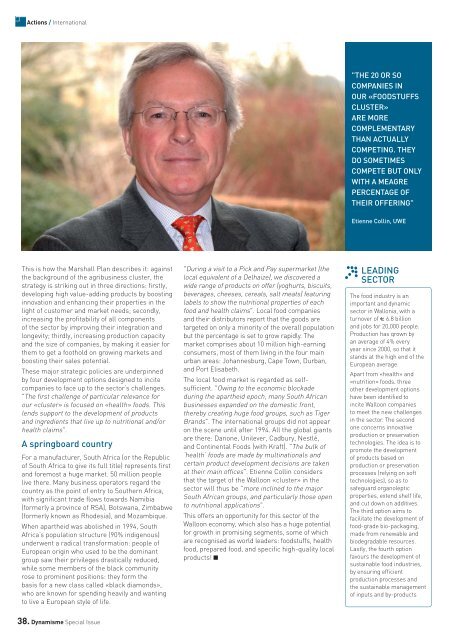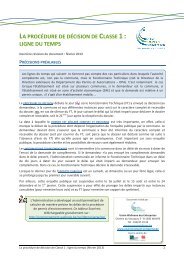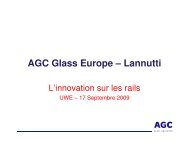EC_Abonnement_soyez de ceux qui_A4.qxp - Union Wallonne des ...
EC_Abonnement_soyez de ceux qui_A4.qxp - Union Wallonne des ...
EC_Abonnement_soyez de ceux qui_A4.qxp - Union Wallonne des ...
You also want an ePaper? Increase the reach of your titles
YUMPU automatically turns print PDFs into web optimized ePapers that Google loves.
Actions / International<br />
"THE 20 OR SO<br />
COMPANIES IN<br />
OUR «FOODSTUFFS<br />
CLUSTER»<br />
ARE MORE<br />
COMPLEMENTARY<br />
THAN ACTUALLY<br />
COMPETING. THEY<br />
DO SOMETIMES<br />
COMPETE BUT ONLY<br />
WITH A MEAGRE<br />
PERCENTAGE OF<br />
THEIR OFFERING"<br />
Etienne Collin, UWE<br />
This is how the Marshall Plan <strong>de</strong>scribes it: against<br />
the background of the agribusiness cluster, the<br />
strategy is striking out in three directions: firstly,<br />
<strong>de</strong>veloping high value-adding products by boosting<br />
innovation and enhancing their properties in the<br />
light of customer and market needs; secondly,<br />
increasing the profitability of all components<br />
of the sector by improving their integration and<br />
longevity; thirdly, increasing production capacity<br />
and the size of companies, by making it easier for<br />
them to get a foothold on growing markets and<br />
boosting their sales potential.<br />
These major strategic policies are un<strong>de</strong>rpinned<br />
by four <strong>de</strong>velopment options <strong>de</strong>signed to incite<br />
companies to face up to the sector’s challenges.<br />
"The first challenge of particular relevance for<br />
our «cluster» is focused on «health» foods. This<br />
lends support to the <strong>de</strong>velopment of products<br />
and ingredients that live up to nutritional and/or<br />
health claims".<br />
A springboard country<br />
For a manufacturer, South Africa (or the Republic<br />
of South Africa to give its full title) represents first<br />
and foremost a huge market. 50 million people<br />
live there. Many business operators regard the<br />
country as the point of entry to Southern Africa,<br />
with significant tra<strong>de</strong> flows towards Namibia<br />
(formerly a province of RSA), Botswana, Zimbabwe<br />
(formerly known as Rho<strong>de</strong>sia), and Mozambique.<br />
When apartheid was abolished in 1994, South<br />
Africa’s population structure (90% indigenous)<br />
un<strong>de</strong>rwent a radical transformation: people of<br />
European origin who used to be the dominant<br />
group saw their privileges drastically reduced,<br />
while some members of the black community<br />
rose to prominent positions: they form the<br />
basis for a new class called «black diamonds»,<br />
who are known for spending heavily and wanting<br />
to live a European style of life.<br />
"During a visit to a Pick and Pay supermarket (the<br />
local e<strong>qui</strong>valent of a Delhaize), we discovered a<br />
wi<strong>de</strong> range of products on offer (yoghurts, biscuits,<br />
beverages, cheeses, cereals, salt meats) featuring<br />
labels to show the nutritional properties of each<br />
food and health claims". Local food companies<br />
and their distributors report that the goods are<br />
targeted on only a minority of the overall population<br />
but the percentage is set to grow rapidly. The<br />
market comprises about 10 million high-earning<br />
consumers, most of them living in the four main<br />
urban areas: Johannesburg, Cape Town, Durban,<br />
and Port Elisabeth.<br />
The local food market is regar<strong>de</strong>d as selfsufficient.<br />
"Owing to the economic blocka<strong>de</strong><br />
during the apartheid epoch, many South African<br />
businesses expan<strong>de</strong>d on the domestic front,<br />
thereby creating huge food groups, such as Tiger<br />
Brands". The international groups did not appear<br />
on the scene until after 1994. All the global giants<br />
are there: Danone, Unilever, Cadbury, Nestlé,<br />
and Continental Foods (with Kraft). "The bulk of<br />
‘health’ foods are ma<strong>de</strong> by multinationals and<br />
certain product <strong>de</strong>velopment <strong>de</strong>cisions are taken<br />
at their main offices". Etienne Collin consi<strong>de</strong>rs<br />
that the target of the Walloon «cluster» in the<br />
sector will thus be "more inclined to the major<br />
South African groups, and particularly those open<br />
to nutritional applications".<br />
This offers an opportunity for this sector of the<br />
Walloon economy, which also has a huge potential<br />
for growth in promising segments, some of which<br />
are recognised as world lea<strong>de</strong>rs: foodstuffs, health<br />
food, prepared food, and specific high-quality local<br />
products!<br />
LEADING<br />
S<strong>EC</strong>TOR<br />
The food industry is an<br />
important and dynamic<br />
sector in Wallonia, with a<br />
turnover of € 6.8 billion<br />
and jobs for 20,000 people.<br />
Production has grown by<br />
an average of 4% every<br />
year since 2000, so that it<br />
stands at the high end of the<br />
European average.<br />
Apart from «health» and<br />
«nutrition» foods, three<br />
other <strong>de</strong>velopment options<br />
have been i<strong>de</strong>ntified to<br />
incite Walloon companies<br />
to meet the new challenges<br />
in the sector. The second<br />
one concerns innovative<br />
production or preservation<br />
technologies. The i<strong>de</strong>a is to<br />
promote the <strong>de</strong>velopment<br />
of products based on<br />
production or preservation<br />
processes (relying on soft<br />
technologies), so as to<br />
safeguard organoleptic<br />
properties, extend shelf life,<br />
and cut down on additives.<br />
The third option aims to<br />
facilitate the <strong>de</strong>velopment of<br />
food-gra<strong>de</strong> bio-packaging,<br />
ma<strong>de</strong> from renewable and<br />
bio<strong>de</strong>gradable resources.<br />
Lastly, the fourth option<br />
favours the <strong>de</strong>velopment of<br />
sustainable food industries,<br />
by ensuring efficient<br />
production processes and<br />
the sustainable management<br />
of inputs and by-products.<br />
38. Dynamisme Special Issue

















